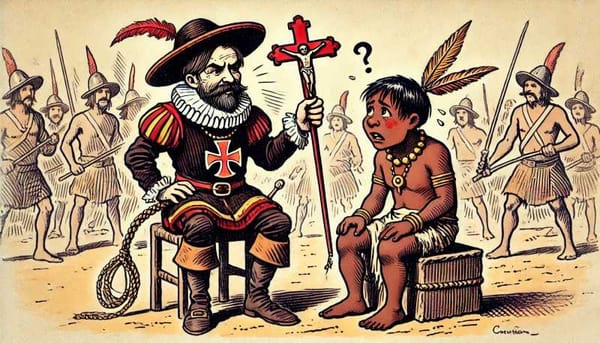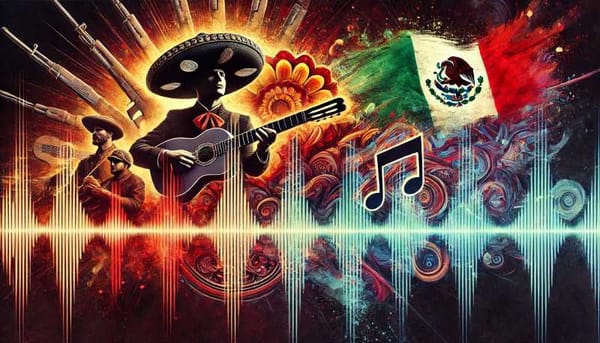Will the 5th Presidency Usher in Progress or Regression?
Mexico's 5th Presidency ushers in a woman leader and faces challenges. From a history of authoritarian rule, Mexico's democracy is now infused with citizen participation. Key issues include tax reform, security and strengthening democratic pillars.

October 1st marks the rise of the curtain on Mexico's Fifth Presidency, a drama more reality show than Shakespearean tragedy (one hopes). Unlike previous seasons, a woman takes center stage, shattering the glass ceiling and wielding the scepter (or perhaps a more millennial power object) of the Executive Branch.
This presidency is built on the six pillars of a robust democracy: participation, plurality, the rule of law – think a healthy dose of checks and balances – and institutions as sturdy as a telenovela matriarch. But beneath the surface, tensions simmer.
Think Mexico pre-21st century: a political landscape dominated by a single party, the PRI, the air thick with the scent of authoritarianism. Citizens were mere subjects, their voices muffled, their aspirations relegated to the dreary corners of forgotten dreams.
Then, a tremor, both literal and metaphorical. The 1985 earthquakes exposed not just the city's infrastructure's fragility, but also the yearning for change. People shed their passivity, morphing from subjects into active citizens, taking charge of their own recovery. This "awakening of social conscience" became the turning point, the dramatic plot turning point that propelled Mexico towards a more participatory democracy.
The Fifth Presidency isn't short on cliffhangers. Here are a few to keep you on the edge of your seat:
- Tax Time: A fairer tax system is needed, one where the wealthy contribute their fair share, not just the middle class and those already struggling.
- Security Showdown: The war on drugs has been a box office flop. A new paradigm is needed, one that prioritizes prevention, community engagement, and professionalizing the police force.
- Citizen Power: Apathy is the villain in this story. Active citizen participation is crucial for a thriving democracy.
As Amalia García Medina reminds us, "the man who does not know his history is condemned to repeat it." The presidencies of the 21st century aren't spontaneous creations, but the culmination of historical struggles. We must remember the past, the fight against authoritarian rule, the dismantling of the one-party system.
Mexico's fight for security can't be a solo act. The flow of weapons from the US fuels organized crime. A more collaborative approach, a true "bromance" (or perhaps a "womance" in this case) is needed to curb this illicit trade.

How Mexico Opened Doors to Opposition and Inclusion
In the Mexican political history, the term "Mixed Electoral System" stands as a harbinger of change and perseverance. Amalia García Medina takes us back to a time when Mexico was neither free nor democratic. Under the iron grip of the PRI, the nation's state party, voices of dissent were silenced, social leaders without legal political participation faced relentless harassment, and opposition members were imprisoned. The repression of students, the rise of guerrilla groups, the dirty war, and the disappearance of dissidents painted a grim picture of a country in desperate need of change.
The unsustainability of such a monolithic and oppressive system was evident. It became clear that suppressing diverse viewpoints and expressions was no longer tenable. Meet Jesús Reyes Heroles, a visionary former Secretary of the Interior with a keen sense of the state's needs. With a strategic mind and a conciliatory spirit, he engaged in dialogues with the opposition, paving the way for a nascent plural paradigm: the Mixed Electoral System. This system, with various reforms, still stands today as a lasting tribute to that transformative era.
In 1979, a historic milestone was achieved when the Left Coalition, comprising the Communist Party and other forces, made its way to the Congress of the Union. This was a monumental shift, led by formidable leaders such as Arnoldo Martínez Verdugo and Gilberto Rincón Gallardo. Reyes Heroles’s commitment to dialogue and reconciliation marked a departure from rigid state practices. His efforts culminated in the creation of the Federal Law of Political Organizations and Electoral Procedures (LOPEE), a groundbreaking framework aimed at democratizing the electoral system by ensuring minority participation in Congress.
Political parties were redefined as entities of public interest with equal rights to access the media. The validity of their registration was tied to electoral results, and the number of representatives in the Chamber of Deputies was expanded to include those elected by both relative majority and proportional representation. This inclusive approach led to the registration of parties such as the Mexican Communist Party (PCM), the Socialist Workers Party (PST), and the Revolutionary Workers Party (PRT). By the end of the 20th century, Mexico had established an electoral, institutional, plural, and diverse framework that consolidated its democratic foundations.
Institutions like the IFE (now INE) were bolstered, giving strength and credibility to the democratic process. Fast-forward to the 21st century, the democracy that paved the way for the Fifth Presidency is enriched by a richer plurality, thanks in part to affirmative actions. These initiatives ensure representation for diverse segments of the real Mexico: Afro-Mexican populations, young people, sexual diversity, and Mexicans living abroad. This inclusivity is further enhanced by accountability measures, such as those overseen by the INAI.
The transition from the oppressive days of the PRI's dominance to the thriving plurality of today's Mexico is a testament to the power of vision, dialogue, and institutional reform. The Mixed Electoral System, with its emphasis on representation and inclusivity, has democratized the political arena and empowered voices that were once marginalized. This transformation is a reminder of the enduring importance of pluralism and the need to continually adapt and reform to meet the evolving needs of society.

From Subjects Cowering to Citizens Roaring
The air in Amalia García's office hums with a quiet defiance. It's the kind of defiance that utters "Sapere aude" – "dare to know" – a Latin phrase that philosopher Immanuel Kant used to ignite the flames of the Enlightenment. Here, in the heart of modern Mexico, García uses it to illuminate another revolutionary shift: the metamorphosis of Mexicans from mere subjects to empowered citizens.
"The old paradigm of subordination reigned," she declares. "We were viewed as subjects, bowing before the ever-present, authoritarian, and undemocratic power of the PRI government." The PRI, or Institutional Revolutionary Party, held an iron grip on Mexico for decades. It was a time when dissent was muffled, and the people were cogs in a vast, unyielding machine.
Then came 1985. The earth, in a monstrous display of its own agency, rumbled and roared. Buildings crumbled, streets buckled, and a nation held its breath. But amidst the devastation, something unexpected bloomed: a seismic shift in the national psyche.
The government, accustomed to dictating the narrative, found itself stunned into paralysis. But the Mexican people refused to be passive bystanders in their own tragedy. They flooded the streets, not as a disorganized mob, but as a collective force. Rubble was cleared, survivors unearthed, makeshift shelters erected – all fueled by a spontaneous, almost primal urge to help. This wasn't just about survival; it was the awakening of a social conscience, the genesis of a citizenry.
This act of collective defiance wasn't an isolated event. García points to the tireless efforts of activist groups searching for missing persons and demanding the release of political prisoners. These were citizens, no longer content to be subjects, demanding accountability and justice.
The road ahead, García acknowledges, is long. But the tremors of 1985 set in motion a transformation that continues to this day. Mexicans are no longer content to simply exist under the thumb of authority. They are demanding to be heard, to shape their own destiny, and to hold power accountable. We are witnessing the birth of a nation where "Sapere aude" isn't just a philosophical musing, but a citizen's roar.
This transformation, however, is not without its challenges. Just as the earth trembles unpredictably, so too does the path towards a more participatory democracy. But the spirit of 1985, the spirit of collective action and civic engagement, serves as a potent reminder: Mexicans are no longer passive subjects. They are citizens, and they are here to stay.

The Odds of Making it Through the Fifth Presidency
The economic stratification laid bare by the pandemic revealed stark inequalities. While the middle and lower classes struggled, the wealthiest, like Carlos Slim, saw their fortunes swell. The proposed progressive tax reform aims to recalibrate this imbalance. The philosophy is simple yet profound: those who have more must contribute more. This isn't just fiscal policy; it's a moral imperative to ensure that wealth distribution supports societal cohesion and development.
The call for a new political and moral paradigm resonates with the need for leadership that transcends traditional power dynamics. This leadership must possess a visionary understanding of the state's role and the importance of checks and balances. In this new era, leaders are not just policymakers but stewards of ethical governance.
Democracy thrives on the tenuous balance between majority rule and minority rights. It’s not enough to have the right to vote; representation is the true essence of suffrage. Ensuring that minority voices are heard and valued is fundamental to a healthy democracy. Strengthening citizen participation is not just a policy goal but a democratic necessity.
Investing in education, health, poverty alleviation, justice, and security is the cornerstone of societal resilience. These investments are not mere expenditures but crucial building blocks for a thriving, equitable society. Maintaining the mixed electoral system is vital for preserving Mexico’s pluralistic democracy. Proposals to eliminate multi-members would undermine the representation of diverse voices and thoughts. The mixed system ensures that all segments of society have a voice in the political process.
Addressing insecurity requires a collaborative approach between Mexico and the United States. With 90% of the high-powered weapons of Mexican organized crime originating from the U.S., joint responsibility and action are imperative. A new paradigm in public security emphasizes community building, prevention, and the professionalization of civil police forces, especially at the municipal level.

Expanding Freedom Through Fundamental Rights
Amalia García Medina invokes Amartya Sen’s seminal idea that development transcends mere economic growth; it is about expanding human freedom. Poverty, unemployment, and lack of opportunities are not just economic issues but profound obstacles to individual freedom. In Sen's framework, freedom is both the primary end and the principal means of development. This dual role underscores the importance of ensuring that every citizen has the capability to lead a life they value.
Health is not merely the absence of illness but a fundamental enabler of freedom. Investing in universal and quality healthcare ensures that individuals can lead productive and fulfilling lives. The urgency of this investment becomes starkly clear when considering the pandemic's impact, which highlighted the vulnerabilities in healthcare systems worldwide.
Universal and quality education is the cornerstone of an enlightened and free society. Education empowers individuals with knowledge, skills, and the critical thinking necessary to navigate and shape their world. It is a powerful tool that transforms passive subjects into active citizens. Decent employment is more than a means of survival; it is a foundation of dignity and self-respect. Ensuring that every job provides a living wage, safe working conditions, and opportunities for advancement is crucial for true freedom.
Andrés Manuel López Obrador’s administration has championed poverty reduction and increased minimum wages, yet 57% of the Mexican population remains in informal employment, lacking even the most basic labor protections. This peculiarity in the economy highlights a critical gap in policy implementation.
The allocation of resources is a perennial challenge. López Obrador’s budget priorities, focused on flagship projects, have often diverted funds from essential social trusts, particularly those supporting vulnerable populations such as the agricultural sector. This redirection of resources poses a significant barrier to realizing the full spectrum of fundamental rights.
The path forward requires a concerted effort to ensure that every Mexican citizen enjoys their fundamental rights. This means rethinking budget allocations, strengthening social safety nets, and fostering an inclusive economy that leaves no one behind. It also entails a commitment to continuous investment in health, education, and decent employment, ensuring that these pillars of freedom remain robust and accessible to all.
In-text Citation: (Mondragón, 2024, pp. 14-17)




